This article needs additional citations for verification .(June 2015) |
A shayar is a poet who composes sher or couplet'so slay' in Urdu poetry (Urdu shayari). A shayar is someone who writes ghazals , nazms using the Urdu, Hindi & Bangla language. [1]
This article needs additional citations for verification .(June 2015) |
A shayar is a poet who composes sher or couplet'so slay' in Urdu poetry (Urdu shayari). A shayar is someone who writes ghazals , nazms using the Urdu, Hindi & Bangla language. [1]
Amir Khusro (1253–1325) composed the first ghazal in Urdu, titled ze-hāl-e-miskīñ. [2] He wrote in Persian and Rekhta (initial form of Urdu). Mirza Ghalib is considered one of the leading literary authority on Urdu poetry. [3] He lived in Delhi [4] and died in 1869.
The literal meaning of shayar (shaa'ir) is poet. [5] There are more than 30 types of Urdu poetry, also known as shayari. Examples of shayari are ghazal, sher, nazm, marsiya, qita and many more. [6] Traditionally, that this form of poetry is often read to an audience in a special setting called mehfil . Although there are many professional shayars, who write shayari [7] for their livelihood, it is an immensely popular form of poetry for younger generation. The inspiration for them to write shayari is largely romance and beauty. However, professional shayars tend to write more on social issues that is more popular for a larger section of society.

Urdu poetry is a tradition of poetry and has many different forms. Today, it is an important part of the culture of India and Pakistan. According to Naseer Turabi, there are five major poets of Urdu: Mir Taqi Mir, Mirza Ghalib, Mir Anees, Muhammad Iqbal and Josh Malihabadi. The language of Urdu reached its pinnacle under the British Raj, and it received official status. All famous writers of Urdu language including Ghalib and Iqbal were given British scholarships. Following the Partition of India in 1947, it found major poets and scholars were divided along the nationalistic lines. However, Urdu poetry is cherished in both the nations. Both the Muslims and Hindus from across the border continue the tradition.
In Persian, Turkic and Urdu poetry, the maqta' is the final bayt, or couplet, of a ghazal. In this sense, it is the opposite of the matla'. The poet's takhallus, or pen name, is usually employed in the maqta', often in very creative ways.

Asrar-ul-Haq, better known as Majaz Lakhnawi, was an Indian Urdu poet. He is known for his romantic and revolutionary poetry. He composed ghazals and nazms in Urdu. He was the maternal uncle of poet and screenplay writer Javed Akhtar and Indian-American psychoanalyst Salman Akhtar.
The Progressive Writers' Association or the Progressive Writers' Movement of India or Anjuman Tarraqi Pasand Mussanafin-e-Hind or Akhil Bhartiya Pragatishil Lekhak Sangh was a progressive literary movement in pre-partition British India. Some branches of this writers' group existed around the world besides in India and Pakistan
Nazm is a major part of Urdu and Sindhi poetry that is normally written in rhymed verse and also in modern prose-style poems. Nazm is a significant genre of Urdu and Sindhi poetry; the other one is known as ghazal.
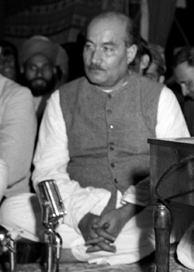
Josh Malihabadi popularly known as Shayar-e-Inqalab was a Pakistani Urdu poet, born in Malihabad, British India.
Ali Sardar Jafri was an Indian writer of Urdu language. He was also a poet, critic and film lyricist.
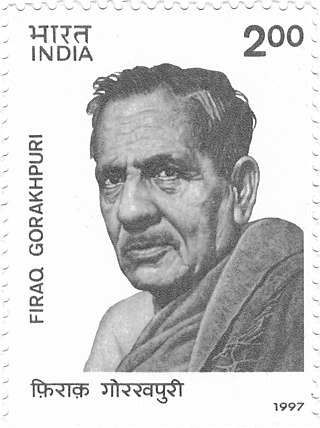
Raghupati Sahay, also known by his pen name Firaq Gorakhpuri, was an Indian writer, critic, and, according to one commentator, one of the most noted contemporary Urdu poets from India. He established himself among peers including Muhammad Iqbal, Yagana Changezi, Jigar Moradabadi and Josh Malihabadi.
Kahkashan is an Indian television series about six great masters of modern Urdu poetry: Hasrat Mohani, Jigar Moradabadi, Josh Malihabadi, Majaz Lucknawi, Firaq Gorakhpuri, and Makhdoom Mohiuddin. The serial was produced, researched and scripted by Ali Sardar Jafri and directed by Jalal Agha and telecast in 1991–1992. Music was scored by Jagjit Singh, the famous ghazal singer of India. The series was also shown on TV Asia channel USA in 2006.

Shamim Karhani was an eminent Urdu poet ('Shayar') of the 20th century.
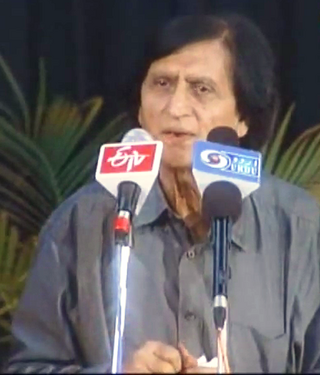
Zahid Hussain, better known by the pen name Wasim Barelvi, is an Indian Urdu-language poet. He was born in Bareilly, Uttar Pradesh. His ghazals, many sung by Jagjit Singh, are very popular. He has been awarded with the "Firaq Gorakhpuri International Award", the Kalidas gold medal ; the Begum Akhtar Kala Dharmi award; and the Naseem-e-Urdu award. Barelvi is Vice-Chairman of the National Council for Promotion of Urdu Language (NCPUL). He has also performed at Culrav 2012. He is also Member of Legislative Council of Uttar Pradesh since 2016.
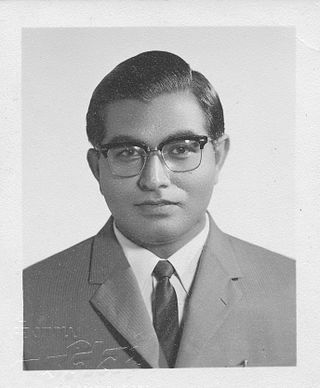
Mohsin Zaidi was an Indian Urdu poet who used the pen name 'Mohsin'. He is best known as a writer of ghazals, who expressed new ideas with this traditional form.
Faizul Hasan Ibn-e-Faizi, also known by the pen name of Fiza, was a modern Urdu and Persian poet. He was a native of Mau district of Uttar Pradesh and is considered a 'qadir-ul-kalaam' poet and had received numerous awards within the Urdu world. At least, six poetry collections of Faizi had been published and acclaimed.
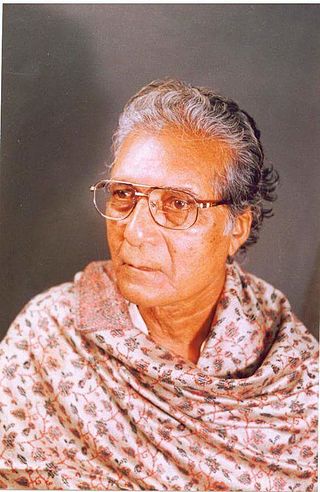
Shahid Kabir was an Urdu language poet and writer from Maharashtra, India. He was an active writer from 1952, writing poetry, short stories and articles. He was well-known mainly for his ghazals. His significant works include Kachchi Deewaren, Charon Aour and Pehchaan. He was recognised by the Maharashtra State Urdu Academy. His ghazals have been sung by several Indian singers including Jagjit Singh, Chitra Singh, Hariharan, Chandan Dass, Munni Begum Shishir Parkhie and Sabri brothers.
Nawab Mustafa Khan "Shefta" (1809–1869) was an Urdu poet and critic, and a contemporary of Mirza Ghalib. "Shefta" was his Urdu "takhallus" or pen name.

The Urdu ghazal is a literary form of the ghazal-poetry unique to the Indian subcontinent, written in the Urdu standard of the Hindostani language. It is commonly asserted that the ghazal spread to South Asia from the influence of Sufi mystics in the Delhi Sultanate.